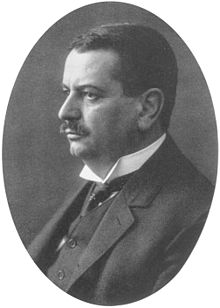August Cramer
Johann Baptist August Cramer (born November 10, 1860 in Pfäfers , † September 5, 1912 in Göttingen ) was a German psychiatrist .
Life
August Cramer was a son of the institutional psychiatrist Heinrich Cramer . He studied medicine in Munich , Freiburg im Breisgau and in Marburg with his father. After his license to practice medicine he worked at the clinic in 1886. He received his doctorate in Marburg in 1887 and moved to Freiburg as an assistant doctor and in 1889 as a second doctor to the Eberswalde state insane asylum . He completed his habilitation in Göttingen in 1895 and became senior physician and deputy director of the provincial insane asylum and psychiatric clinic in Göttingen on March 1, 1895 . Appointed associate professor in 1897, he succeeded Ludwig Meyers in Göttingen in 1900 .
During his tenure as director of the institution, Cramer developed the psychiatric-neurological field of work in Göttingen considerably. In 1901 he founded the Polyclinic for Mental and Nervous Diseases, initially in rented rooms. From this foundation, the Göttingen University Clinic for Psychiatry and Neurology later developed. He initiated the establishment of a provincial safe-keeping house for so-called "asocial" mentally ill people and founded a remedial and educational institution for psychopathic welfare children and in 1903 the provincial sanatorium for mentally ill people "Rasemühle" , the first German people's nerve sanatorium .
Cramer wrote a multiple introduction to forensic psychiatry and in 1889 coined the term "sounding thoughts". He used to refer to the phenomenon that some patients experienced their thoughts as being expressed within their chest. He also presented the first clinical study on proprioceptive and kinaesthetic hallucination . He also made a name for himself as a pioneer in child and adolescent psychiatry .
Shortly before his unexpected death, Cramer had accepted the call to take over the Berlin chair for psychiatry and head of the Charité's mental hospital as the successor to Theodor Draw .
Publications
- The hallucinations in the muscular sense in the insane and their clinical significance. A contribution to the knowledge of paranoia. Mohr, Freiburg i. Br 1889.
- Contributions to the finer anatomy of the medulla oblongata and the bridge with special consideration of the 3rd-12th centuries. Cranial nerves. With 46 illustrations in the text. Fischer, Jena 1894.
- Forensic psychiatry. A guide for medical professionals and lawyers. Gustav Fischer, Jena 1897.
- About the causes of children's nervousness outside of school. In: Collection of treatises in the field of educational psychology and physiology; 2.5. 1899.
- The civil servant doctor and medical expert. With special consideration of the German Reich and Prussian state legislation. Fischer's Medicin. Bookstore H. Kornfeld, Berlin 1902.
- with Otto Binswanger et al. : Textbook of Psychiatry. Fischer, Jena 1904.
- The public health system in Prussia under consideration. the relevant Reich legislation. Fischer's Medicin. Bookstore H. Kornfeld, Berlin 1904.
- About public danger from a medical point of view. Lecture. Marhold, Halle a. P. 1905.
- The nervousness. Their causes, manifestations and treatment; for students and doctors. Fischer, Jena 1906.
- On the theory of affects. Ceremonial speech on behalf of the Georg-August-Universität on the academic award ceremony on June 17, 1908. Dieterich, Göttingen 1908.
- Puberty and school. Teubner, Leipzig 1910.
- with Ludwig Bruns and Theodor Draw: Handbook of nervous diseases in childhood. Karger, Berlin 1912.
literature
- Heiner Fangerau: Politics and nervousness: Foundation and operation of the first German people's nerve sanatorium "Rasemühle" near Göttingen between 1903 and 1914 . In: Krankenhauspsychiatrie 16 (2005), pp. 25–32. doi : 10.1055 / s-2004-818534
- Georg Gruber, On the history of psychiatry in Göttingen. In: Sudhoffs Archiv 40 (1956), pp. 345–371.
- Werner Leibbrand: Cramer, Johann Baptist Joseph August. In: New German Biography (NDB). Volume 3, Duncker & Humblot, Berlin 1957, ISBN 3-428-00184-2 , p. 391 ( digitized version ).
Individual evidence
- ^ Jan Dirk Blom: A Dictionary of Hallucinations . Springer, NY 2010, p. 208.
- ^ Jan Dirk Blom: A Dictionary of Hallucinations . Springer, NY 2010, pp. 298, 423.
| personal data | |
|---|---|
| SURNAME | Cramer, August |
| ALTERNATIVE NAMES | Cramer, Johann Baptist August (full name) |
| BRIEF DESCRIPTION | German psychiatrist |
| DATE OF BIRTH | November 10, 1860 |
| PLACE OF BIRTH | Pfäfers |
| DATE OF DEATH | September 5, 1912 |
| Place of death | Goettingen |
